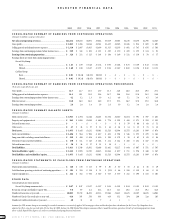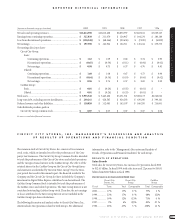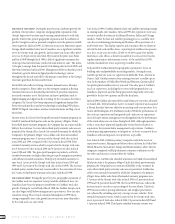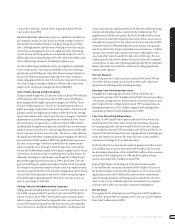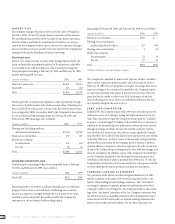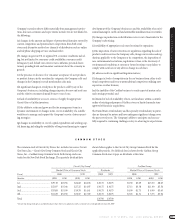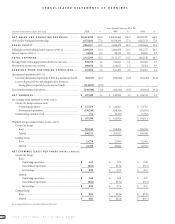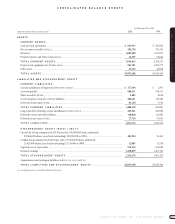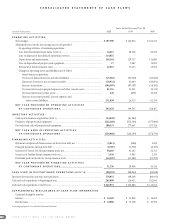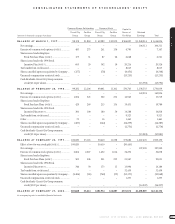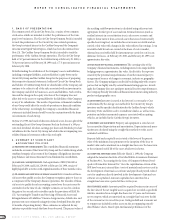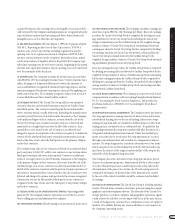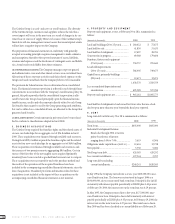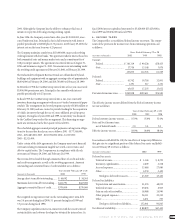CarMax 2000 Annual Report Download - page 29
Download and view the complete annual report
Please find page 29 of the 2000 CarMax annual report below. You can navigate through the pages in the report by either clicking on the pages listed below, or by using the keyword search tool below to find specific information within the annual report.
CIRCUIT CITY STORES, INC. 2000 ANNUAL REPORT 27
CIRCUIT CITY STORES, INC.
Automotive, Inc.in the Atlanta market for a total of $49.6 million. These
acquisitions were financed through cash payments totaling $41.6 million
and the issuance of two promissory notes totaling $8.0 million. Costs in
excess of the acquired net tangible assets,which are primarily inventory,
were recorded as goodwill and covenants not to compete.
Receivables generated by the Company’s finance operations are funded
through securitization transactions that allow the operations to sell their
receivables while retaining a small interest in them. The Circuit City
Group’s finance operation has a master trust securitization facility for its
private-label credit card that allows the transfer of up to $1.85 billion in
receivables through both private placement and the public market. A sec-
ond master trust securitization program allows for the transfer of up to
$1.75 billion in receivables related to the operation’s bank card programs.
Receivables securitized under the master trust facilities totaled $2.79 bil-
lion at February 29, 2000. In fiscal 1996,Circuit City Stores, Inc.initiated
an asset securitization program on behalf of the CarMax Group. At the
end of fiscal 2000, that program allowed for the transfer of up to $500
million in automobile loan receivables. In October 1999, the Company
formed a second securitization facility on behalf of the CarMax Group
that allowed for a $644 million securitization of automobile loan receiv-
ables in the public market. At February 29, 2000, the program had a
capacity of $559.5 million. Securitized receivables on behalf of the CarMax
Group totaled $887.2 million at the end of fiscal 2000. Under the securiti-
zation programs,receivables are sold to an unaffiliated third party with
the servicing rights retained. Management expects that these securitization
programs can be expanded to accommodate future receivables growth for
both businesses.
In fiscal 1999,CarMax entered into a one-year, renewable inventory financ-
ing arrangement with an asset-backed commercial paper conduit. The
arrangement had a total program capacity of $160 million at February 29,
2000,and was created to provide funding for the acquisition of vehicle
inventory through the use of a non-affiliated special purpose company.
During fiscal 2000 and fiscal 1999, the CarMax Group financed no inven-
tory under this arrangement.This financing arrangement was terminated
in the first quarter of fiscal 2001.
Capital Structure
Total assets at February 29, 2000, were $3.96 billion,up $510.1 million or
15 percent since February 28,1999. A $378.1 million increase in cash
and a $171.5 million increase in inventory contributed to the increase in
total assets.
Over the past three years,expansion for the Groups has been funded with
internally generated cash,sale-leaseback transactions,proceeds from the
February 1997 CarMax equity offering,operating leases and short-term
and long-term debt. Finance operation receivables have been funded
through securitization transactions.
From fiscal 1999 to fiscal 2000,stockholders’equity increased 12 percent
to $2.14 billion. Capitalization for the past five years is illustrated in the
“Capitalization”table below. Higher earnings for the Circuit City business
and the CarMax Group,partly offset by the loss on the discontinuance of
the Divx business,produced a return on equity of 9.8 percent in fiscal
2000,compared with 7.9 percent in fiscal 1999.
Management anticipates that in fiscal 2001 capital expenditures of
approximately $275 million will be funded through a combination of
internally generated cash,sale-leaseback transactions and operating
leases and that securitization transactions will finance the growth in
receivables. At the end of fiscal 2000, the Company maintained a multi-
year,$150 million unsecured revolving credit agreement and $370 million
in committed seasonal lines that are renewed annually with various banks.
The Groups rely on the external debt of Circuit City Stores,Inc.to provide
working capital needed to fund net assets not otherwise financed through
sale-leasebacks or the securitization of receivables. All significant finan-
cial activities of each Group are managed by the Company on a central-
ized basis and are dependent on the financial condition of the Company.
These financial activities include the investment of surplus cash,issuance
and repayment of debt,securitization of receivables,sale-leasebacks of
real estate and inter-group loans.
CAPITALIZATION
Fiscal 2000 1999 1998 1997 1996
(Dollar amounts in millions) $ % $ % $ % $ % $ %
Long-term debt,excluding
current installments......................................... 249.2 10 426.6 17 424.3 18 430.3 19 399.2 23
Other long-term liabilities...................................... 157.8 6 149.7 6 171.5 7 199.4 9 231.8 14
Total stockholders’equity....................................... 2,142.2 84 1,905.1 77 1,730.0 75 1,614.8 72 1,063.9 63
Total capitalization................................................. 2,549.2 100 2,481.4 100 2,325.8 100 2,244.5 100 1,694.9 100







